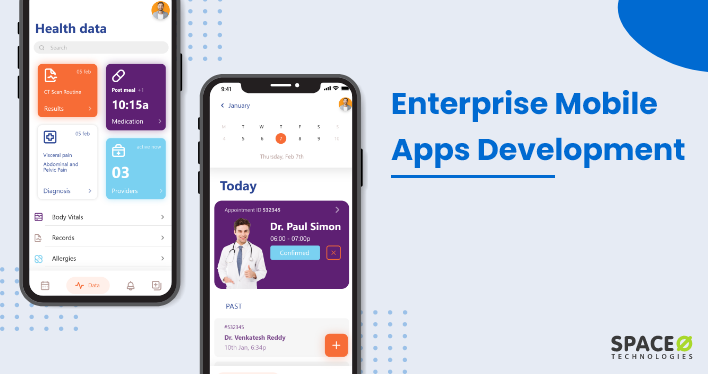Do you
- Want to streamline and simplify your company’s existing business process?
- Want to avoid information duplication within the various department of your business?
- Want to monitor and automize the operations hassle-free?
If yes, you have landed on the right blog.
Today, businesses want to provide mobility solutions to optimize the decision-making process, improve work collaboration, and for better data management. In fact, according to Statista, the estimated revenue that the mobile enterprise application development segment will generate is $218 billion by 2027.
If you have an enterprise mobile app development idea and want to know more about it, this blog will help you.
In this article you will learn:
- What is enterprise app development?
- How to develop an enterprise application from scratch?
- Which features to integrate in enterprise app?
- How much does it cost to develop an enterprise app?
- What are the benefits of developing an enterprise app?
Let’s understand with basics of enterprise application.
Table of Contents
- What is Enterprise Application Development?
- How to Develop Enterprise Mobile App from Scratch. [Step-by-Step Guide]
- Features to Integrate Into Enterprise Mobile App
- How Much Does It Cost to Develop Enterprise Mobile App?
- 6 Benefits of Developing an Enterprise Mobile App
- Types of Enterprise Architecture and Benefits of Choosing Right Enterprise Architecture
- What Type of Business Requires Enterprise Mobile App?
- FAQs About Enterprise Mobile Apps Development
- Grow Your Business With Enterprise Mobile App Development
What is Enterprise Application Development?
Do you know what is enterprise application development? The process of developing enterprise applications for enterprise-grade businesses is often referred to as mobile enterprise application development.
The idea is to build mobile enterprise applications using the latest mobile technologies to solve business problems. Most of these apps are developed to meet the unique business needs specified by your enterprise.
For example:
HubSpot is a CRM platform which tracks customer relationships, helps to grow traffic, and automates the process. HubSpot is ideal for any scaling business (whether you’re small, mid-sized, or enterprise) and any team (such as marketing, sales, customer service, operations, or C-suite).
Let’s further understand how to develop an enterprise mobile app from scratch. And, the step-by-step enterprise mobile app development process
How to Develop Enterprise Mobile App from Scratch [Step-by-Step Guide]
It is important to follow the right steps to create a mobile app for your enterprise project. Let’s look at all the steps, including choosing the right mobile developers to build such an app.
Define the Business Objectives to Develop an Enterprise Mobile App
Before hiring an enterprise app development company, you should know the purpose of building an enterprise application. Make a list of questions and find out.
- Why do you need an enterprise app?
- What purpose will the enterprise mobile application serve?
- What is the problem for which you need enterprise mobile apps?
The purpose and problem statement will help you plan the requirements for enterprise apps.
Understand the Business Requirements for Your Enterprise Solution
The next step is to prepare your project for execution. It will include defining the requirements, knowing the use cases, and identifying the different aspects of the application.
- Study your target market: To plan your project, you need to know the exact nature of issues the target audience faces
- Know the Competition: Identify and research the existing competition for enterprise mobile app development. You will find several players in this niche.
- Define the Use Cases: Where will you use the enterprise apps? It is important to define the use case from every perspective to build the application.
- Benefits of the App: During this phase, you will also state the app’s benefits for your business
Want to Develop Enterprise Mobile App?
Our experienced enterprise app development consultants will understand your requirements and help you develop an enterprise app as per your business requirements.

Choose the Enterprise App Development Company or Hire Enterprise App Development Team
Choose the leading enterprise mobile app development company from Clutch and know about the experience and enterprise of building the enterprise app. The right team or company can ensure capable solutions and the launch of the right enterprise mobile application for your business. It is critical to look for a suitable partner.
You can identify the perfect partner by considering the following factors:
- Experience: You need someone with experience in enterprise-grade solutions.
- Expertise and Knowledge: They should be proficient with the development methodologies, processes, and best practices. The team should know technical aspects such as data processing and transaction control to improve the process-driven solution.
- Budget: The pricing and engagement models should be custom for the enterprise mobile and web development services. If you have already defined the estimate, the app development team should be within the range specified.
- Portfolio: They should have a range of such apps under their portfolio that can help you understand their work better.
- Tools: They should have app management, cloud computing, project management, and data management tools that can accelerate development.
- Quality Assurance: The team should be complete with quality assurance engineers that can provide fully tested native and cross-platform app solutions.
- Security: They should offer completely secure mobile apps that incorporate multi-factor authentication.
To be precise, you need to select a company that can develop enterprise mobility solutions as per your business requirements, time, and budget.
Choose the Technology Stack for Your Enterprise App Solution
The software developers can help you choose the right technology stack for enterprise mobile apps. If you hire dedicated developers from a leading enterprise app development company, they will help you use the relevant stack depending on the approach you have chosen for the application development.
For example, a cross-platform enterprise app can be developed using React Native or Flutter solutions. Similarly, if your enterprise mobile app developers plan for native mobile app development, you should choose the stack depending on the mobile enterprise application platform.
For iOS applications, you need to use Swift or Objective-C to build the application. In the case of Android, you can use Java or Kotlin.
At this stage, you will also look at the technical feasibility of the mobile app solution. For instance, whether the backend for the mobile project can access the data. You will need to use the backend and frontend technologies for interactive solutions.
UI/UX Design of Your Enterprise Mobile App
This step is where you build a miniature version of your app design prototype. It is at this stage that you should go with rapid prototype development. Make sure that the UI/UX design team is adding the must-have features to the prototype of the consumer apps to see if they will work.
The storyboard will help in understanding the user’s movements along the app. It will help build the best design for the experience and interface. If you are looking for the top designs from leading enterprises, here are the top enterprise app examples you need to know.
Develop, Test, and Deploy Your Enterprise Mobile App
Once your prototype and designs are approved, you can start with development. To accelerate the launch, you should incorporate agile methodology into your development. It will enhance the outcome and ensure a well-tested enterprise app.
You should opt for a test-driven environment where you can continuously test and build the app. Use the best coding practices.
Before you launch the application, make sure your enterprise app undergoes:
- User Acceptance Testing: This is to be conducted before you start building the application. It will help to know if the existing and potential customers want the features and enterprise app you are suggesting.
- Beta Testing: Allow a select few access to the mobile app to know if the application is usable, functional, and devoid of errors.
Once your app is tested, an enterprise app developer will deploy your enterprise app solution on the App Store and Play Store as per your requirements.
Let’s understand which features you can integrate into the enterprise mobile app.
Features to Integrate Into Enterprise Mobile App
When a software developer with technical expertise sits to work on your mobile app, the first thing they want to discover is the list of features.
What unique and important features should be part of enterprise mobile application development?
| List of Must-have Features | Description |
|---|---|
| Push Notifications |
|
| Social Integration |
|
| Security |
|
| Offline Mode |
|
| Login/Registration |
|
| Dashboard |
|
| Search |
|
| Feedback System |
|
| Analytics |
|
Now, you know the complete process to develop an enterprise app. Let’s even know the cost to develop an enterprise app.
Want to Hire Enterprise Mobile App Developers?
Contact us with your requirements. We have experience developers to develop feature-rich enterprise apps. We offer hourly, fixed, and flexible engagement models that you can select as per your requirements.
How Much Does It Cost to Develop Enterprise Mobile App?
Let’s even check the complete details to build the basic, medium, and complex enterprise mobile app solution.
| The Complexity of the App | Features of Enterpries Mobile App Solution | Development Cost | Timeline |
|---|---|---|---|
| Basic App |
| $10,000 – $40,000 | 4-5 weeks |
| Intermediate Complexity App |
| $40,000 – $60,000 | 7-9 weeks |
| Advanced Enterprise App |
| $60,000 – $1,00,000 | 10-11 weeks |
Want to know more about the cost? Check out the blog about cost of mobile app development for your enterprise project. Since you already know the features of developing an enterprise app solution, let’s understand the benefits to develop an enterprise mobile app.
6 Benefits of Developing an Enterprise Mobile App
The question you should ask before indulging in enterprise app development is whether you would benefit from it. What are the associated advantages of going ahead with enterprise mobile app development? Let’s answer this question
Data Management Becomes Easy
Traditionally, collecting, managing, and interpreting data came with a lot of effort. However, enterprise apps have made managing data efficient and led to improved operations. As a result, interpreting data and gaining insights is easier.
Monitor the Goals Hassle-free
Businesses need to focus on their goals and objectives. With enterprise apps, you can set the KPIs and translate the entire data using a single dashboard. You reduce efforts and paperwork while measuring the business goals. It improves the overall process efficiency and insight-to-decision time.
Simplifies Data Management and Operations
With the help of such apps, your team can perform their jobs better. Analytics help you identify patterns within your data. This provides higher levels of data security, increases efficiency, eliminates data duplication, and improves workflows.
Strengthens Business Communication
Businesses are dependent on external applications for communication. However, they may not be streamlined to your business needs. In fact, they are not secure channels to send out data and documents. Enterprise apps offer secure and real-time communication channels that help with the exchange of data and instant collaboration.
Improves Your Bottom Line Revenue
With enterprise mobile app solutions, businesses can have insight-to-decision-making time reduced massively. The business owners have full visibility and control of their shop floor activities. It empowers the owners and allows them to take the right decisions. Enterprise apps increase employee productivity by optimizing business processes to improve efficiency.
Automates Workflow to Collaborate Easily
Automated workflows enable sales teams to reduce time-consuming administrative tasks and eliminate tedious data entry to close deals faster. Teams can save a lot of time sending emails and updating information in multiple tools. Everything happens out in the open, with more control over data accessibility than before.
Since you know the benefits of enterprise mobile app solutions, let’s further understand the enterprise app architecture to develop enterprise app solutions.
Types of Enterprise Architecture and Benefits of Choosing Right Enterprise Architecture
The architecture for mobile enterprise app development comprises three layers:
- The Database Layer: The low-level dependency modules are part of this layer. It includes network, storage, and middleware needed to build enterprise mobile app solutions
- The Business Layer: This includes the rules defined for the particular logic. It is responsible for defining the workflows, completing the calculations, and incorporating the interfaces
- The Presentation Layer: This layer is important for interaction. It offers all the interface elements that make up the perfect presentation.
The enterprise application architecture can help define the patterns and techniques software development companies can use to build their mobile app. It comprises interactions, components, and core services that help implement the application.
Architecture is an essential element of enterprise mobile apps. Here are some of the benefits of using the ideal enterprise architecture for your business.
- Makes code implementation easy and project coordination a seamless procedure. This results in smooth project scoping and execute consistent project deliverables.
- Enterprise Architecture eliminates long and repetitive processes. This results in significant resource and cost savings.
- Analyze and respond to changes in the industry faster and prevent threats that may enter the system .
- Uses the database and services for specific functions after defining them properly.
- It prevents bigger problems by enabling the causes of problems to be detected faster. This reduces the loss of time and workforce caused by disruptions
What Type of Business Requires Enterprise Mobile Apps?
Here are some of the business types that require enterprise mobile apps.
| Industry Type | Use Cases |
|---|---|
| Healthcare Industry |
|
| Retail Industry |
|
Now that we have seen the enterprise mobile app development in detail let’s answer a few frequently asked questions.
FAQs About Enterprise Mobile Apps Development
What are the types of enterprise applications?
The different types of enterprise applications include:
| Enterprise Application Type | Description |
|---|---|
| ERP | Unifies the processes and modules to streamline operations. |
| HRMS | Streamlines the human resource processes and operations-from payroll to invoicing. |
| CRM | Helps build strong relationships, offers support, improves procurement, and boosts your sales team. |
| Payroll Software | Handles all accounts-related data, from managing invoices to paying the staff. |
What are the enterprise requirements in mobile applications?
Listing the enterprise requirements for mobile apps
- Exceptional Connectivity: You should be able to access the enterprise mobile apps outside the organization, even in low Internet connectivity
- Security-first Application: You should list out the security-related requirements, including role-based access and authentication to enhance the usability
- Futuristic: These applications should be designed keeping the future trends, newer needs, and changing mindsets of the customer in mind.
What are the mobile app development trends?
Below listed are the top enterprise mobile app development trends.
| Mobile App Development Trends | Description |
|---|---|
| Cloud Computing | Reduces infrastructure costs, improves efficiency and leads to better development. |
| Low Code Development | Helps accelerate development by offering platforms that can be used by customers with limited to no knowledge of technology. |
| Artificial Intelligence | Improves efficiency and productivity in the organization. Increases accuracies. |
| Progressive Web Apps | Improves app usability and reliability on mobile devices for better engagement. |
Grow Your Business With Enterprise Mobile App Development
Enterprise app development can help you manage business operations and streamline different functions. It can empower every employee, enhance efficiency, and improve the bottom line.
There are several benefits associated with enterprise mobile application development. However, you should partner with a capable mobile app development company to leverage these benefits.
SpaceO Technologies is a leading mobile application development company with expertise in enterprise-grade and startup solutions. We have delivered 400+ enterprise app solutions for diverse industries.
To know if your concept is feasible, connect with our top developers by filling out the contact us form.





